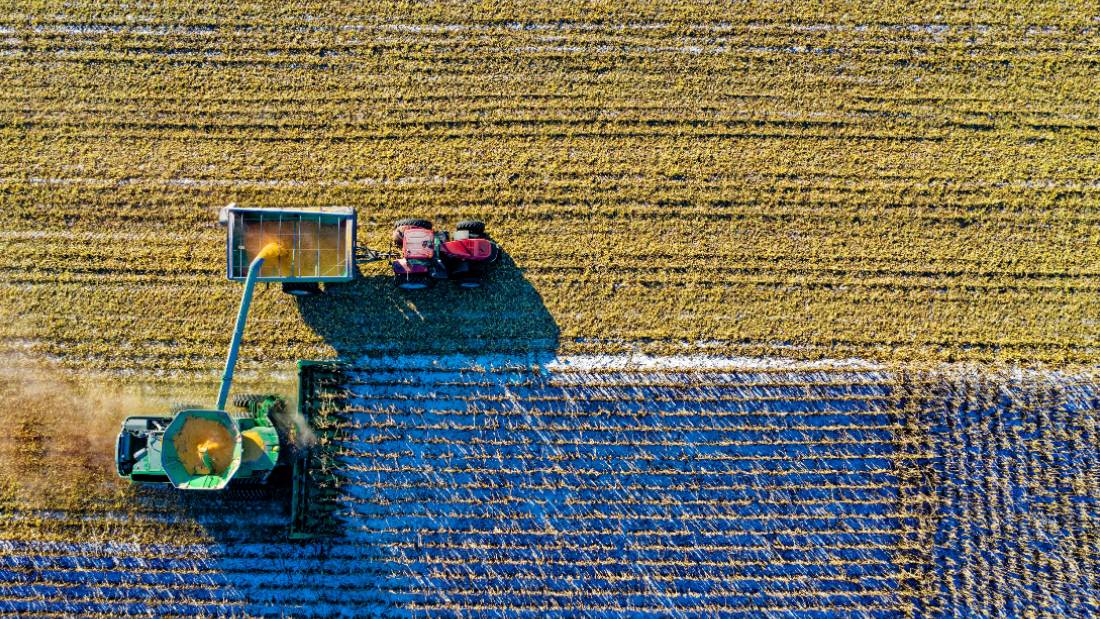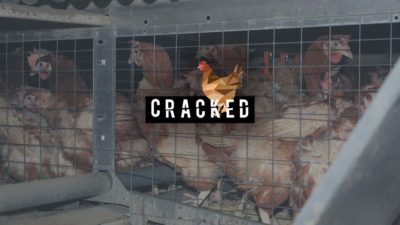Don’t animals die due to crop farming, too? A vegan response

In a nutshell…
The ‘crop deaths’ argument is a common one and argues that veganism is pointless because animals still die in crop agriculture, too.
- It is true that some animals do die in crop farming, but it is impossible to know how many – and many non-vegans probably overestimate the problem!
- That said, most crops are grown as feed for animals, and we could reduce total agricultural land usage by three-quarters if we all went vegan.
- This means that non-vegans are responsible for far more crop deaths than vegans are – and not only that, but there are the hundreds of animals that die to be eaten by each non-vegan every year! Taken together, over a billion a year just in the UK.
- Veganic agriculture has growing methods like vertical farming that can eliminate animal deaths totally, while animal agriculture never can.
The full story
“Get off your high horse,” vegans are frequently told by meat-eaters. “Crop farming causes millions of animals to die, too!”
As a vegan, it can sometimes be difficult to know where to start with this argument, especially considering that the whole point of veganism is surely to prevent animals from dying… isn’t it?
Firstly, it is important to know that veganism is not the total prevention of suffering and death of all forms, but rather the minimisation of the suffering we cause as far as possible and practicable. It is not possible in our current world to live a totally harm-free lifestyle – but it is possible to minimise the harm we cause as far as we can.
There are, however, a number of holes in this common ‘crop deaths’ objection to veganism – not least of which is the fact that non-vegans are responsible for more crop deaths than vegans are (as well as the fact that vegans don’t ride horses in the first place!).
Let’s look at just a few of the reasons why.
How many animals die from crop farming?
It is difficult if not impossible to tell exactly how many animals die from crop farming, whether in a given field or globally. The reason for this is that scientists and farmers can take surveys of animals living in a field before harvesting and then again after harvesting and use this as a rough metric for the number killed. However, doing so is a very loose estimate given that most of these animals are very small, mobile, sensitive to disturbance and will likely run away from farming machinery. It is famously difficult to sneak up on a mouse; it is even harder to do so when driving a combine harvester. For this reason, it is quite likely that the number of crop deaths is substantially lower than estimated. Furthermore, research suggests that small animals are at a higher risk of predation on a pasture land compared to land where crops are grown.
Of course, there are some deaths that happen as a result of crop harvesting as fields are also often sprayed in pesticides, insecticides and other chemicals that can poison animals, except on organic farms. This is still something that should concern us all.
What are most crops used for?
Most agricultural land around the world is used for animal agriculture, including vast swathes of land used to grow crops for animals – hence, ironically, most animals that die in crop farming are killed in the production of animal foods!
In fact, 85 per cent of the farmland that feeds the UK is dedicated to producing animal products like meat, dairy and eggs, both in terms of the land on which animals are kept and the land required to grow animal feed. Even free-range, grass-fed animals still require crops to be grown to supplement their diet.
In fact, if the world were to move away from eating meat, fish, dairy and eggs tomorrow, we would reduce the total amount of land needed by up to three-quarters. This is a huge saving, given that half of the world’s habitable land is used for agriculture.
Given this land saving, we could further reduce deaths caused by crop agriculture by using some of the land saved to de-intensify crop agriculture. As the insatiable demand for meat and dairy rises, we are trying to grow as much food in as little space as possible, hence the need for insecticides and pesticides. If we were to have a more efficient, lower land-use veganic agricultural system, there would no longer be the requirement to grow crops so intensively – hence, fewer animals would die in the process of plant-based agriculture.
If we truly care about the animals that die from crop agriculture – as we all should – then the only answer is to go vegan. Most animals that die in crop agriculture do so because of the sheer number of crops we have to grow for animal feed in the first place.
Does it always need to be this way?
All that said and done, the vegan position is that we ought to minimise the suffering for which we are responsible as far as is possible and practicable. Veganism is not the position that we have to completely eliminate any suffering that we cause – as this is totally impossible in our complex world – but rather the position that, where we can make better choices, we should do so. A plant-based diet causes so much less suffering than an animal-based diet that they are almost incomparable; it is, in other words, a no-brainer.
That said, we can still improve things! Veganism is not a destination in itself but a journey towards improving every aspect of the impact of one’s life. Technology is making it ever easier and more possible to live ethically.
For example, vertical farming is one option that avoids crop deaths. In a vertical farm, plants are grown in beds that are stacked vertically on top of one another (hence the name), meaning that each square meter of land can yield far, far more food than before. Not only this, but it is more water efficient, more resource efficient, more energy efficient and has the advantage of not requiring large-scale machinery or artificial chemicals being sprayed over land and causing animals to die.
In short, it is a method of veganic agriculture that can entirely eliminate the deaths of animals.
Animal agriculture, on the other hand, has no such alternative. Whenever we eat the flesh of an animal, we know that the animal had to live and die for our taste pleasure – there is no other option!
Conclusion
In short, yes, animal deaths due to crop farming are an important issue – but a non-vegan diet causes far more crop deaths than a plant-based diet does, and a veganic farming system will one day be able to eliminate animal deaths totally while traditional animal agriculture simply never can.
The answer, then, is simple: go vegan!




